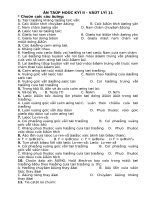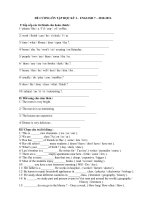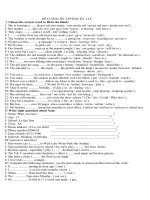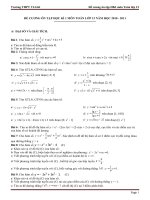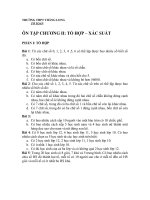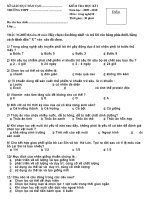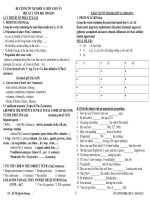Đề cương ôn tập học kỳ 1. lớp 11
Bạn đang xem bản rút gọn của tài liệu. Xem và tải ngay bản đầy đủ của tài liệu tại đây (126.44 KB, 4 trang )
ĐỀ CƯƠNG ÔN TẬP KHỐI 11- MÔN ANH VĂN
HỌC KỲ I- NĂM HỌC 2010-2011
I, LÝ THUYẾT ÔN PHẦN TỰ LUẬN
1. PRONUNCIATION(1m).
Group the words containing the same final sounds into /t/, /d/, /id/
2. Preposition of place: 0,5m( 2 sentences)
- In, on, at, behind, in front of, near, between……..
- In London, in the living-room, in the fridge…......
- On the floor, on the ceiling, on the wall………….
- At Sarah’s house, at the bus-stop, at the cinema…
* Preposition after some verbs:
- glance at, complain about, blow out, take care of, participate in, take part in,
apologize for, accuse…of, insist on, thank….for…
3. Correct form of verb: V+ ing, Vo, to+ Vo, Bare infinitive: 0,75m (3
sentences)
(Textbook p20,21& 54,55)
4. Correct form of word: 1m ( 2 sentences)
- limit, limited, limitation, limiting
- compete, competition, competitor, competitive
- volunteer, voluntarily, voluntary
- literate, illiterate, literacy, illiteracy
5. Conditional sentences (3 types) 0,75m (3 sentences)
6,REWRITE THE SENTENCE SO THAT IT HAS A SIMILAR MEANING
TO THE FIRST ONE (3m) (textbook p 64,65-74,75)
Reported speech :
* to Vo: -with Obj (1sentence) (advise, persuade, invite, tell, ask,
encourage, remind)
-without Obj (1sentence) (promise, agree, refuse, offer, volunteer…)
* V-ing: -with Obj (1 sentence)(thank…for, warn…against, prevent…from,
accuse….of, congratulate…on, blame… for, stop…from,…)
-without Obj (1 sentence) ( suggest, admit, deny….)
*Conditional sentences: Unless= if …not (1 sentence)
*Menh lenh +Or = If you don’t ………(1 sentence)
7, PUT THE VERB IN THE CORRECT TENSE (1m)(2 sentences)
* Simple present tense (1 sentence) * Simple past tense (1 sentence)
* Past continuous (1 sentence) * Past perfect (1 sentence)
8, READ THE PASSAGE, THEN ANSWER THE QUESTIONS (2m)
UNITS : 4,6,7 * 1 Yes- No question * 3 WH- questions
II.BÀI TẬP ÔN THI HKI LỚP 11 (2010-2011)
1. PRONUNCIATION(1m).
Group the words containing the same final sounds into /t/, /d/, /id/
Home based, improved, sophisticated, discarded, fascinated, engraved,
gathered, accomplised, advanced, released, influenced, survived, notified,
landed, appreciated.
PH ÁT ÂM /ED/:
• /id/: t, d (tình đầu)
• /t/: k, p, f, s, ch, sh, h (khỉ phập phồng sợ chó shói hổ)
• /d/
• /t/ • /d/ • /id/
• • •
• • •
• • •
• • •
II. Fill in the blanks with an appropriate preposition.
1. How are you? I haven’t seen you _________ ages.
2. He left school ________ the age of 18.
3. I’m going on holiday __________ the end of this month.
4. She was born ______________ May 12
th
, 1990.
5. Mary was standing _________ front of her desk.
6. It happened ________ 7.00 ________ the evening.
7. Don’t be afraid ________ the dog. He’s quite harmless.
8. Have you seen Peter lately? I’ve been looking ________ him this week.
9. She has learnt English for 3 years, and she is good _________ English now.
10 He always prevents me_______ doing my duty
11. If I were 5 years younger, I would apply_________ that job.
12. I’m grateful __________ you for your kindness.
13. They are now in Paris; they will leave ____________ London next week.
14 . Mary blew _________ the candles, then cut her birthday cake.
15. He thanked me ____________helping him.
16. Tom insisted _____________ driving me to work.
GV : Đỗ Thị Quỳnh Hương - 1 ÔN TẬP THI HKI LỚP 11 ( 2010-2011)
17. You can get there __________ bus, or ________ foot.
18. Don't forget to congratulate him __________ his birthday.
III. Give the correct form of the verbs in brackets:
1. After lunch, I often (take)_______________ a rest.
2. My sister usually (practice) __________________playing the piano in the
evening.
3. My brother (visit) _________________me last month.
4. My brother (visit) _________________me twice a week.
5. My brother (visit)__________________ me before he went to HCMC.
6. Maria_______(enter) the university after she had graduated form the community
college
7. While my father (read) _______ a newspaper, I (learn) ______ my lesson and my
sister (do) ______ her homework.
8. They (arrive) ______________________at the club two days ago.
9. She (learn) ___________________French for several years.
10. They (play) ________________football when their mother came back home.
11. By the time we (get) ___________there, the play (start) ________________
already.
12. Yesterday he (go) _____________home after he (go) ___________to the store.
13. After she (return) ___________home, she (cook) __________herself a good
dinner
14. If he (eat) _________________all that he will be ill.
15. If I (know)_________________ his address, I’d give it to you.
16. I shouldn’t drink that wine if I (be) __________________ you.
17. If the rain (stop) _________________, I would have gone for a walk.
18. When I (arrive) ____________at this house, he still
(sleep)_________________.
19. What you (do) ______________________ yesterday?
20. If you had worked harder, you (pass) ________________your final exam.
21. They (make_____________________ fewer mistakes if they were more careful.
22. If he (have) _____________________ more money, he will travel more.
23. If we (invite) _____________________ her, she will go dancing with us.
24.Did I finished the work in time, I (go) _____________________ to the club.
25. Unless they (pass) _____________________ the exams, they would join the army.
26. If today (be) _____________________ Sunday, we would go to the seaside.
27. If John (play)________________ for our football team, we would not have lost
the game
28. If she did her hair differently she (look)_________________ quite nice.
29. The trees (grow)_____________faster if she waters them more often
IV. Gerund ( V-ing) / Infinitive ( To V / Vo ):
1) The teacher permits us (go) ……………………….out in a minute .
2) Tell him (come) ………………………..to see me at once.
3) He advises us (be) ………………………..more studious.
4) He’s expecting (make) ………………………..a trip to Ha Long Bay.
5) Students stopped (make) ……………………….noise when the teacher came in
6) I enjoy (listen) ………………………..to classical music.
7) He’ll try (not make) ………………..............the same mistake again.
8) Would you mind (buy) ………………………..me a newspaper?
9) Would you like (have) ………………………..a dance with me?
10) I hope (not do) ………………………..that tiring work again.
11) They postponed (build) ……………………….. the school for lack of finance.
12) Are his ideas worth (listen) ………………………..to?
13) He always avoids (meet) ………………………..in the street.
14) Do you agree (lend) ………………………..me some money?
15) Tom refused (give) ………………………..me his address.
16) Do you often practise (speak) ……………………….. English?
17) It takes me hours (written) ………………………..a letter.
18) He is too busy (take) ………………………..care of her.
19) He gave up (smoke) ………………………...
20) I heard them (talk) ………………………..in the next room.
21) He made the child (cry).………………………..
22) I saw him (cross) ………………………..the street.
V. REWRITE THE SENTENCE SO THAT IT HAS A SIMILAR MEANING
TO THE FIRST ONE
2. “Could you close the window ?”
John asked Peter. . . . . . . . . . . . . . . . . . . . . .
3. “I hear you passed your exam. Congratulation!” Nam said to me.
⇒ Nam congratulated me . . . . . . . . . . . . . . . . . . . . . . . . . . . . . . . . . . . . . . . . . . . .
4. “I’m sorry, I didn’t phone you earlier,” Lan said to me.
⇒ Lan apologized . . . . . . . . . . . . . . . . . . . . . . . . . . . . . . . . . . . . . . . . . . . . . . . . . .
5. “It was nice of you to help me. Thank you very much,” Tom said
⇒ Tom thanked me. . . . . . . . . . . . . . . . . . . . . . . . . . . . . . . . . . . . . . . . . . . . . . . . .
6.“ If you like, I’ll help you do the decorating, Bac”
⇒ Linh offered ....................................................................................………..
7. “I only borrowed your car for some hours,” the man said.
⇒ The man admitted ………………………………………………………..........
GV : Đỗ Thị Quỳnh Hương - 2 ÔN TẬP THI HKI LỚP 11 ( 2010-2011)
8. “I’m sorry, I was rude to you yesterday”, I said to him.
⇒ I apologized him. . . . . . . . . . . . . . . . . . . . . . . . . . . . . . . . . . . . . . . . . . . . . . . . . .
9. “I will drive you to the airport”, John said to Linda
⇒ John insisted . . . . . . . . . . . . . . . . . . . . . . . . . . . . . . . . . . . . . . . . . . . . . . . . . . . .
10."You stole my watch."⇒Tim accused me………………………………………
11. John said, “You’d better not lend them any money, Daisy.”
⇒
John advised Daisy
. . . . . . . . . . . . . . . . . . . . . . . . . . . . . . . . . . . . . . . . . . . . . .
12. “Would you like to have a drink with me?” he said
⇒ He invited . . . . . . . . . . . . . . . . . . . . . . . . . . . . . . . . . . . . . . . . . . . . . . . . . . . . . . .
13. “Let’s go this way”
⇒ He suggested. . . . . . . . . . . . . . . . . . . . . . . . . . . . . . . . . . . . . . .
14. “Don’t forget to do your homework”, said our teacher to us
⇒ Our teacher reminded us. . . . . . . . . . . . . . . . . . . . . . . . . . . . . . . . . . . . . . . . . .
15. “I phone the police”
⇒ She threatened. . . . . . . . . . . . . . . . . . . . . . . . . . . . . . .
16. “I didn’t say that”
⇒She denied . . . . . . . . . . . . . . . . . . . . . . . . . . . . . . . . . . . . . . . . . .
17. “ Take part in my speaking English Club .”
⇒ He encouraged us……………………………………………………………
18. “I desperately want to become a doctor”
⇒ He dreamed. . . . . . . . . . . . . . . . . . . . . . . . . . . . . . . . . . . . . . . . . . . . . . . . . . . . .
19. “I won’t allow you to get in touch with him”
⇒ Her father prevented her . . . . . . . . . . . . . . . . . . . . . . . . . . . . . . . . . . . . . . . . . .
20. If you don’t study harder, you won’t pass the exam.
⇒ Unless………………………………………………………………………….
21.Hurry up , or you will be late for school.
⇒ If ………………………………………………………………………………
VI. WORD FORM :
1. These (voluntary) ………………………come from a high school near here.
2. The role that women could play was socially( limit )……………………………
3. Only highly (literate) ………….people are capable of discussing these subjects.
4. The English Speaking (compete) ……………… was attended by representative
of three classes of my school.
5. The VN Society of Learning promotion started a campaign for (illiterate)
……………… eradication.
6. University are very (competition) …………………………for the best students.
7. He is the only (competition) …………………that has not run this race before.
8. Those students always (competition ) ……………for their teacher’s attention.
9. Jill (volunteer) ……………………… to decorate the hall for the get-together.
10. A (voluntary) ………………is someone who serves in a community primarily.
11. Many students in my country (voluntary ) ………………………… go to
remote areas to help the people there.
12. When she retired, she did a lot of (volunteer )………service for the Red Cross
VII. Read the following passage carefully and answer the questions that follow.
VOLUNTEER WORK
Each nation has many people who voluntarily take care of others. For example,
many high school and college students in the United States often spend many
houses as volunteers in hospitals, orphanages or homes for the aged. They read
books to the people in these places. Sometimes the students just visit them, play
games with or listen to their problems.
Other young volunteers work in the homes of sick or old people. They clean up
their houses, do their shopping or mow their lawns. For boys who no longer have
fathers, there is a voluntary organization called Big Brothers. College students take
these boys to baseball games and help them to get to know things that boys usually
learn from their fathers.
Volunteers belive that some of the happiest people in the world are those who help
to bring happiness to others.
Answer the questions
1. Where do high school and college students usually do as volunteers?
....................................................................................................................................
2. What do other young volunteers work in the homes of sick or old people?
……………………………………………………………………………………..
3. What is the name of a voluntary organisation for boys who no longer have
fathers?
………………………………………………………………………………….
4. Does each nation have a lot of people who voluntarily take care of others?
…………………………………………………………………………………….
SPRING SCHOOL
GV : Đỗ Thị Quỳnh Hương - 3 ÔN TẬP THI HKI LỚP 11 ( 2010-2011)
Spring school is an informal school. It provides classes to disavantaged children in
Ho Chi Minh city. Around 30 street children live and study at school and about 250
children with special difficulties from district 1 regularly attend classes.
The Organization for Education Development co- operated with Spring School to
set up English classes in 1998. Dance, theatre, singing and circus classes were set up
a year later. Children from these classes participate in fundraising performances.
They raise money to continue their English and performance Arts classes.
Spring school requires volunteers to help organises their fundraising dinner held
annually in June. This is an exciting night in which children perform circus, theatre,
dance, and singing at one of the largest hotels in Ho Chi Minh city. They also need
foreign volunteers to contact sponsors and help to expand the school required from
February until July to help organise these events.
It is hoped that more schools like Spring School will soon be found in other
cities in Viet Nam.
1. What is the aim of Spring School?
....................................................................................................................................
2. Were dance, theatre, singing and circus classes were set up in 1999?
………………………………………………………………………………………
3. Where do children dance, sing and play music?
………………………………………………………………………………………
4. Why are foreign volunteers needed?
………………………………………………………………………………………
THE QUIZ SHOW
My best friend Jenny appeared on a TV quiz show a few nights ago. It was
very exciting. We all knew that she would.be on, so all our friends met at her parents’
house to watch it. Her parents videoed it too, of course. The programme started at
half past seven. We screamed and clapped when we saw Jenny. She looked great. She
had had her hair done, and was wearing the new top she had bought the day before.
She sat in the chair in the middle of the studio while the presenter.asked her some
questions. The questions got harder and harder as they increased in value If she didn’t
make any mistakes and get the most difficult question right, she would win a million
pounds. By this time, Jerry had won a thousand pounds. That was definitely hers,
whatever happened. She answered the next question correctly, which was worth five
thousand pounds. I didn’t know the answer, but she did know! Then with the next
question, she took a risk but got the answer wrong. She was gone out of the game.
Still, she had her thousand pounds,and we were very proud of her.
Answer the questions
1/ What is the name of the writer’s best friend ?
...................................................................................................................................
2/ How was a TV quiz show a few nights ago ?
..............................................................................................
3/ Why was Jerry gone out of game?
....................................................................................................................................
4/ Did she still have five thousand pounds?
.................................................................................................................................
GV : Đỗ Thị Quỳnh Hương - 4 ÔN TẬP THI HKI LỚP 11 ( 2010-2011)
